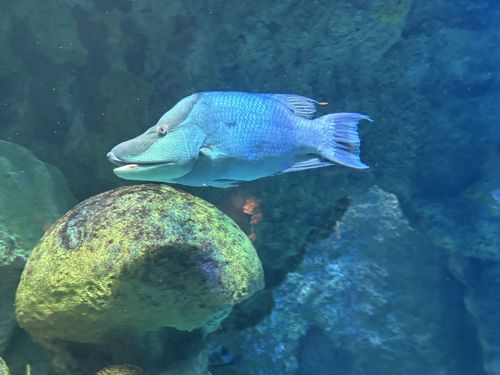Napoleon Wrasse or Humphead Wrasse
Scientific Name: Cheilinus undulatus
Order & Family: Perciformes, Labridae
Size: Males can grow up to 2.3 meters (7.5 feet) in length and weigh up to 190 kg (420 pounds). Females are generally smaller, reaching up to 1 meter (3.3 feet).

Natural Habitat
Found in tropical and subtropical waters of the Indo-Pacific region, typically in coral reefs and along drop-offs from the surface down to about 100 meters.
Diet & Feeding
They feed on a variety of benthic invertebrates including mollusks, crustaceans, and echinoderms. They are one of the few predators of the toxic Crown-of-Thorns Starfish.
Behavior Patterns
The Napoleon Wrasse is generally a solitary fish, but they can be seen in small groups. They are diurnal, active during the day, and seek shelter in caves or under ledges at night. They are known for their ability to change sex from female to male over their lifetime (sequential hermaphroditism).
Risks & Benefits
Potential risks to humans: Overfishing has led to their classification as endangered due to demand for their meat in East Asian markets. They pose no direct risk to humans otherwise. Benefits to ecosystem: They play a crucial role in maintaining the health of coral reefs by preying on organisms that can harm coral, such as the Crown-of-Thorns Starfish.
Identified on: 9/4/2025